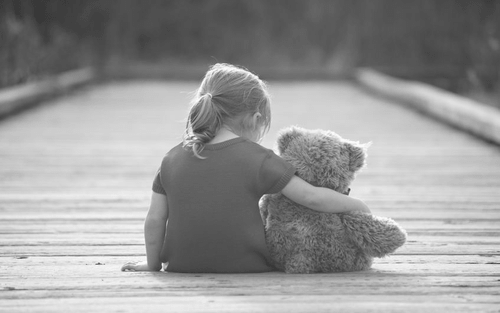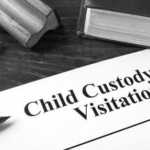Getting divorced can be much more difficult when there are minor children involved, as it not only directly affects the parties but the children as well. As we have discussed in previous blogs, children can be positively and negatively impacted by divorce. Coming to terms with the end of your marriage is one thing, but breaking the news to your children is a whole other ballgame.
Telling your kids about your pending divorce may be the toughest conversation you’ll ever have. Regardless of whether or not it will come as a surprise to the children, it’s still a tough pill for them to swallow as children naturally want their family to remain intact. As said by M. Gary Neuman, author of Helping Your Kids Cope with Divorce, “[t]his is a conversation that the children will remember for the rest of their lives.” Research has shown that over 75% of divorcing parents spend less than ten minutes talking to their children about divorce. It’s imperative that both parties work together to discuss the best way to break the news to the children as this will have a lasting impact on them. It’s also important to keep in mind that how you handle the situation and act towards your co-partner may have an effect on how a judge determines custody. While there is no foolproof way to have this conversation, here are a few helpful tips:
1) Timing is everything. Do not tell your children until you are 100% sure about moving forward with a divorce. There is no reason to put them through that emotional rollercoaster if you are still up in the air about what you want to do. While there is never a “good” time to break the news to your children, be sure to do so when you have plenty of time after the conversation to be with them. They will need time and space to let it sink in. The last thing they need is to be immediately rushed off to a birthday party or a sporting event.
2) Present a united front. If possible, you and your soon-to-be-ex-spouse should sit down with the children together and explain the situation. Regardless of whether or not it was a joint decision, it’s best to incorporate the word “we” as much as possible when explaining the decisions that have been made. This will protect the children from feeling that they may have caused the divorce or that they must align with one parent over the other. As Judith Ruskay Rabinor, Ph.D., author of Befriending Your Ex After Divorce: Making Life Better for You, Your Kids and Yes, Your Ex, said, “[t]his isn’t about you; it’s about your children’s emotional well-being.” By coming across as a united front, it helps the children know that as parents you can still work together to be there for them.
3) Plan out what you will say. Regardless of how great your improvising skills are, this is not the conversation to test them out on. Here are some key messages that you and your co-parent should say during the initial conversation:
- “We both love you very much and nothing will ever change that.”
- “This is not your fault and there is nothing you could have done to prevent it. This is something mom and dad have decided after a long time of trying to make things work.”
- “No one is blaming anyone else. We want you to love both of us and we never want you to feel like you need to choose sides.”
- “Even though things are going to change, we will always be here for you and we will get through this together.”
4) Talk to the entire family. Experts have found that it is best to break the news with all of the children present. After you have the initial conversation, you and your co-parent can then follow up with each child individually. However, if there are concerns that an older child may not take the news well and his/her reaction is likely to upset the younger child, it may be best to talk to each child separately.
5) Be ready for any reaction. Every child is different. Some children may cry, some may throw a tantrum, and some may brush it aside and ask “when is supper?” Some may ask an abundance of questions, some may say nothing. You know your child best. Read their body language to determine what they need, whether it’s space and time for the news to sink in or a reassuring hug.
6) Have a follow-up conversation. Give the kids a few days and then have another discussion. Give them a more detailed plan of what will happen (i.e., where the children will be staying and with whom). It may be beneficial to create a calendar that shows the children whose days are “mom’s days” and which days are “dad’s days.” This may take away some of their anxiety and provide them with stability and structure. Be sure to also answer any of their questions (be honest if you do not know the answers) and reassure them that everything will work out and that you are there for them.
7) Be open to questions. It is going to take time for your children to process the situation and how they feel about it. Expect to have countless conversations with them as the divorce process moves forward. It’s important for you and your co-parent to be open and honest when answering questions and responding to your children’s emotional needs. They need both of you now more than ever.
8) Do your best to co-parent. Your children will be watching and worrying about how you and your co-parent are going to act around each other. During the weeks and months following this difficult conversation, do your best to treat your co-parent with compassion and respect, and try to maintain your family routines as much as possible, even if you are now doing them separately. The children need to see that while things are going to change, some things will remain the same and this will help them gradually recover and adjust to the new situation. Keep in mind that your ability to co-parent and to foster a relationship between your children and co-partner is part of the best interest of the child factors that a court considers when determining custody.
Here are a few book recommendations that may help as well:
For Parents:
- Putting Children First: Proven Parenting Strategies for Helping Children Thrive Through Divorce by Joanne Pedro-Carroll
- Talking To Children About Divorce: A Parent’s Guide to Healthy Communication at Each Stage of Divorce: Expert Advice for Kids’ Emotional Recovery by Jean McBride
For Kids:
- Two Homes by Claire Masurel
- Mom’s House, Dad’s House by Isolina Ricci
No matter how the conversation goes and the divorce proceedings unfold, make sure to take time to care for yourself and remind yourself that you are not a bad parent for getting divorced. Sometimes getting a divorce is the best thing you could ever do for your children.
If you are currently going through a divorce or are considering one, it may be in your best interest to have an experienced family law attorney at your side to help guide you through the process.
Please contact the Family Law Team at SW&L at 701-297-2890 or email us via the contact form below.
The information contained in this article and on this website is for informational purposes only. Do not rely on the information on this website as legal advice.










